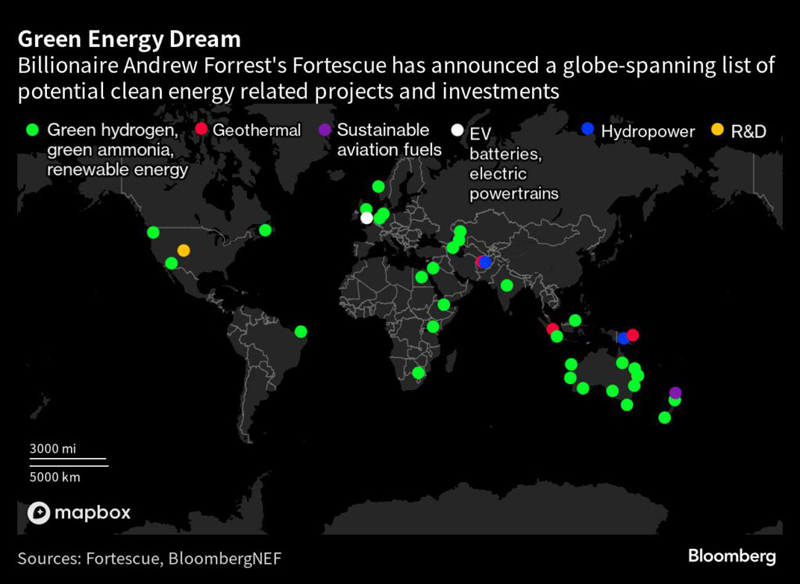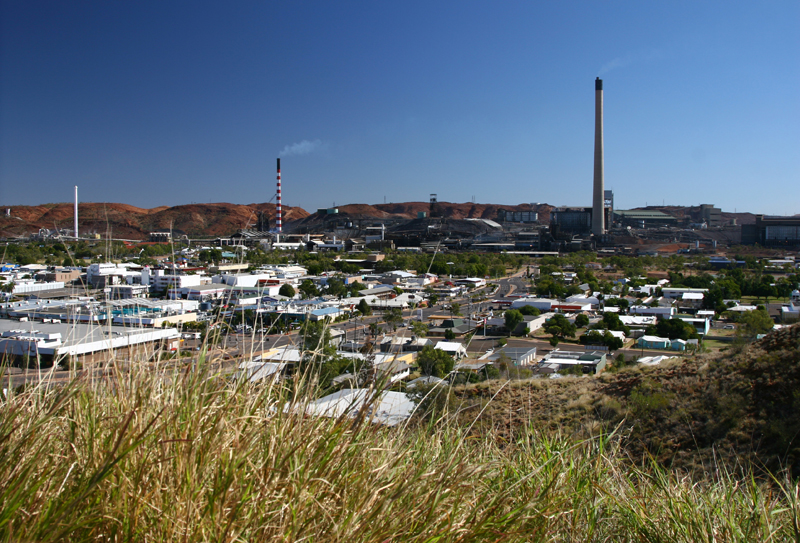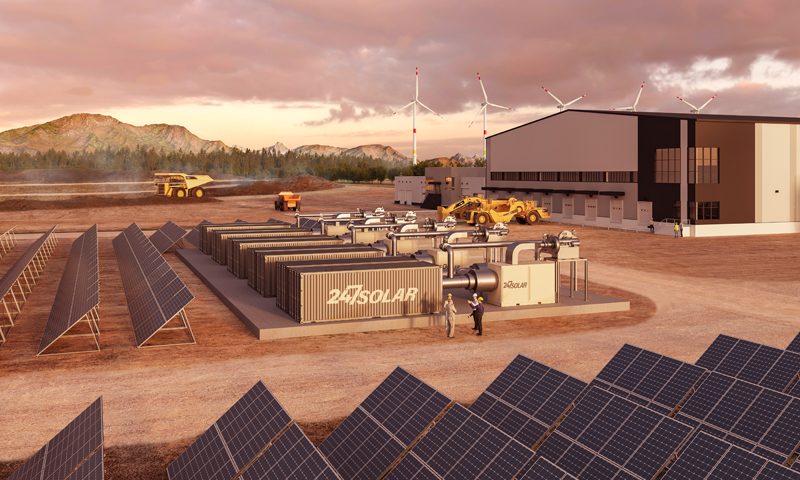CLOCK IS TICKING ON NET ZERO COMMITMENTS
 With six years to go before 2030, miners will soon have to show real progress toward their near-term net zero commitments. Yet, according to a recent article in Energy and Mines, “obstacles remain that could jeopardize the achievement of short and long-term targets.”
With six years to go before 2030, miners will soon have to show real progress toward their near-term net zero commitments. Yet, according to a recent article in Energy and Mines, “obstacles remain that could jeopardize the achievement of short and long-term targets.”
The authors write that most mining companies have announced targets to achieve net zero emissions by 2050, while some have also committed to interim objectives for 2030 or even 2025. For most off-grid miners, this means switching from fossil fuels to renewables-based energy to power their operations.
But, the authors assert, “there simply isn’t enough renewable energy being generated in the world to supply the entire sector, let alone other sectors making the same transition.” According to Anthony Knutson, Metals and Mining Emissions Research Lead at Wood MacKenzie, whom they interviewed, “The biggest challenge is going to be the absolute scale that’s required. And with that scale, the power supply is going to be a real challenge. The mining industry, when it’s not self-supplying, will have to compete with every other renewable power user that’s trying to move towards net zero.”
For encouragement, the authors point to the International Energy Agency’s (IEA) latest Net Zero Roadmap, which reports the continued record growth of key clean energy technologies. However, according to the IEA, global renewable power capacity still needs to triple by 2030 to meet the demands of a 1.5ºC scenario.
Wait and see is out of time
The article cites industry experts who worry about a perceived lack of action and warn that miners cannot simply sit and wait to act on their net zero commitments.
Still, some miners continue to send mixed signals. Maarten Van Koppen, Vice President of Product Management at MacLean Engineering, is quoted as saying, “We’ve seen some mining companies that have set really aggressive targets for 2030 move ahead with [conventional] equipment, even though that equipment might last them 20 years. You’re either not going to meet your targets or you’re going to accept the fact that you’re going to have to replace it halfway through its life. I think there still is often a bit of a disconnect between corporate targets and local decisions.”
The authors partially attribute this to the fact that some of the technology needed to decarbonize is immature, and that there often are competing renewable solutions.
According to Tom Juric, Divisional Director at Liebherr Canada, “There is no single silver bullet, and that makes it difficult for miners to commit to one technology. But he cautions, “don’t wait too long.” He recommends making a decision and sticking to it, while maintaining some flexibility “should something better come along”.
Collaboration can speed solutions
The authors suggest one way for miners to accelerate progress is to share the results of their decarbonization initiatives with the sector more broadly. They say, “Projects like Torex Gold’s Media Luna in Mexico, which involves the construction of a solar plant as well as the implementation of battery-electric equipment, could inform the next steps in the transition – as long as learnings are shared with the wider industry.”
Liebherr’s Juric says, “I think there’s a lot more that could be done in terms of collaboration, if we could just come to terms with this competitive advantage being eroded by sharing information and results … Information and data sharing could accelerate us by decades.”
In any case, time is of the essence and change is coming. “Carbon pricing regulations,” say the authors, “particularly the EU’s Carbon Border Adjustment Mechanism (CBAM), which will effectively impose the EU’s carbon tax on many non-EU mining products – are widely seen as the catalyst needed to prompt action, even from those reluctant to it.”
Read the full article here.
A ROUND-THE-CLOCK CLEAN ALTERNATIVE TO FOSSIL FUELS
An array of 247Solar HeatStorE long-duration thermal batteries
Achieving high levels of renewable energy is particularly challenging for off-grid mines in remote locations because intermittent PV or wind with costly batteries still require dirty, expensive diesel for backup. Many mines also require high-grade heat for on-site processing and other uses. 247Solar offers the only renewable energy technologies that:
- Integrate seamlessly with PV or wind to provide 24/7 dispatchable baseload power
- Provide industrial grade heat up to 970 ℃ (1800 ℉) for ore processing, steam generation and other applications
- Provide their own backup by burning almost any locally available fuel to produce power even when storage is depleted, eliminating gensets and reducing fuel costs up to 80%
Get in touch to learn more
FORTESCUE DOUBLES DOWN ON GREEN ENERGY
 Reuters reports (via Mining.com) that Australia’s Fortescue, perhaps the most forward-looking major miner with respect to climate change, has launched a new investment platform to attract investment in its green energy projects around the world.
Reuters reports (via Mining.com) that Australia’s Fortescue, perhaps the most forward-looking major miner with respect to climate change, has launched a new investment platform to attract investment in its green energy projects around the world.
According to Fortescue Energy CEO Mark Hutchinson, “Fortescue is taking its global pipeline of green hydrogen and green ammonia projects to final investment decision and in doing so, has communicated our intention and desire to bring additional equity investors onboard.”
Per Reuters, “Fortescue, in recent years, has significantly stepped up its investment in renewable projects to cash in on the global transition towards green energy and decarbonization, but that has led to an exodus of high-level management and raised investor concerns.” However, Bloomberg reports (also via Mining.com) that Fortescue’s senior management believes this shows all indicators are pointing in the right direction.
Bloomberg notes that executives at Fortescue Metals Group Ltd. have brushed aside governance concerns and said that shareholders have welcomed the swift action.
While the exits revived debate over the company’s plan to “shift from iron ore giant to green-energy powerhouse,” Hutchinson explained that the departing executives were “not aligned” with Fortescue’s corporate strategy. “The response from investors was quite positive,” Hutchinson said.
NEW PATHWAYS TO SUSTAINABLE MINE CLOSURES

iStock
Australian Mining spotlights a new report from Australia’s Commonwealth Scientific and Industrial Research Organisation (CSIRO) that has identified new opportunities for more sustainable mine closures.
The report, Enabling Mine Closure and Transitions: Opportunities for Australian Industry, outlines what it calls a billion-dollar opportunity to create a new industry in support of mine closures and transitions.
The report outlines opportunities across four categories of solutions:
- Engagement and partnership: Solutions that enable effective engagement, co-design, and mutually beneficial partnerships to improve social performance and reduce risks.
- Waste reduction and recovery: Solutions enabling cost-effective reduction, reuse, and recycling of mine waste to minimise closure liabilities.
- Mine rehabilitation: Solutions improving the performance and cost-effectiveness of mine rehabilitation activities.
- Land use transitions: Solutions addressing challenges in establishing post-closure land uses to generate lasting economic, social, or environmental value.
Read more.
FOLLOW & JOIN 247Solar
LinkedIn US, LinkedinEU, Twitter, YouTube
Contact: info@247solar.com
